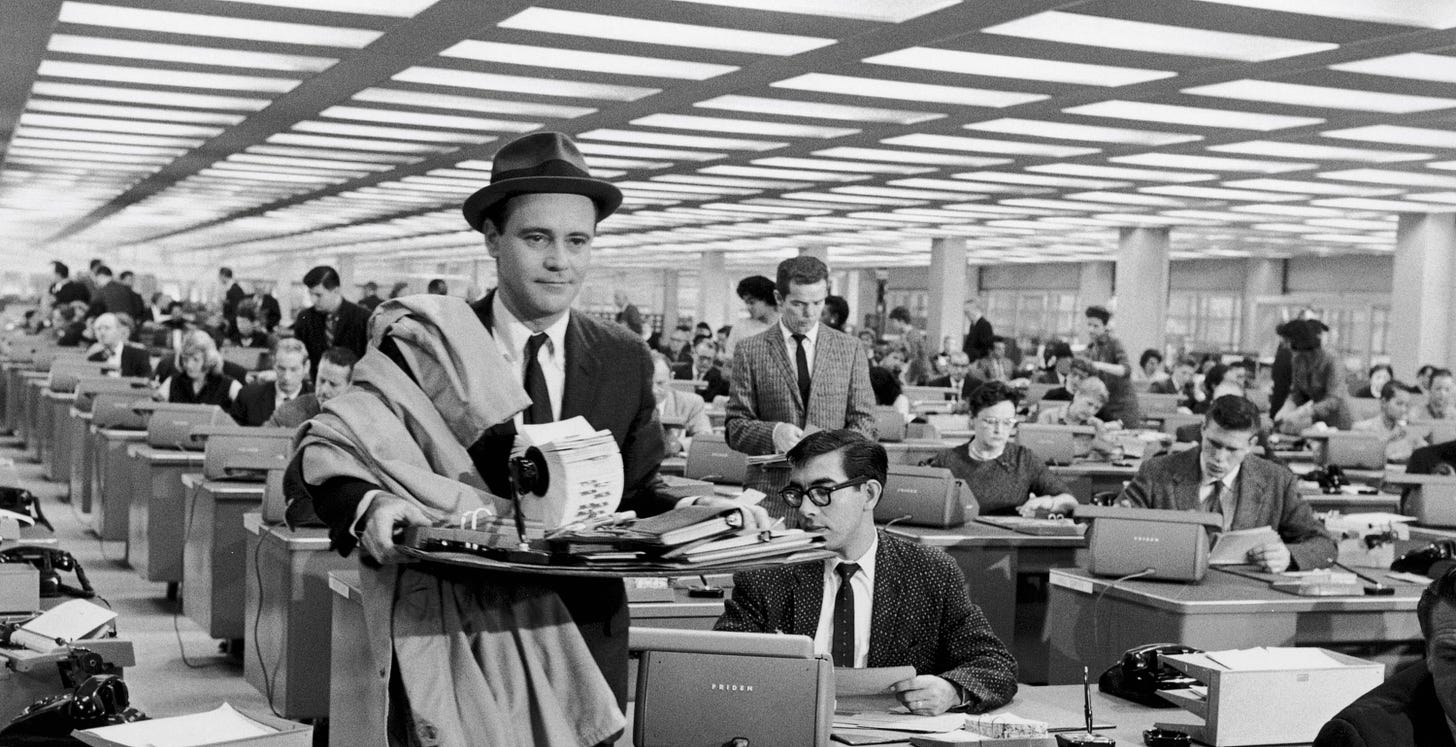Gross is every year’s top-grossing movie, since 1913, reviewed.
THE APARTMENT, director BILLY WILDER, cast JACK LEMMON, SHIRLEY MACLAINE, FRED MACMURRAY, production company MIRISCH/UNITED ARTISTS. 1960. Running time 125 MINUTES
Read about another New York apartment: Hitchcock’s Rear Window.
We’re uptown from Jeff’s Greenwich Village place - “in the sixties,” says Calvin Clifford (CC) "Bud" Baxter (Jack Lemmon), whose apartment it is (51 West 67th Street, to be precise). The Upper West side is a Jewish neighbourhood, since the big migrations at the turn of the 20th Century. This is meaningful because CC (religion unspecified) lives in a building owned by an elderly Jewish woman and - vitally - next door to a Jewish doctor and his family. An aspect of the film’s morality is a sub-plot about the disapproval and ultimately the grudging acceptance of Bud’s flawed character by the good Doctor Dreyfuss (Jack Kruschen).
But this little story about mutual respect and love for others can’t offset the movie’s bleakness. It’s brutal. Billy Wilder makes the most brutal movies. He's the smiling assassin. Did he make a movie that wouldn't break your heart? Disenchant you? Shake your faith in humanity? No he didn't. This one's about wage slavery, bullying, various means of debasement. And the premise, which is based on a story Wilder saw in the news, is almost unthinkably nasty.
Wilder’s cities are the worst places on earth - dark, exploitive, alienating. His men the worst men on earth (CC’s male work colleagues are a kind of demonic chorus - bad to the collective bone). And this workplace is the worst I can think of in a movie - grim, viscerally coercive. I'm going through the other movies in my head: the bad guys are monsters. The nice guys are saps, dweebs, losers. The women beyond rescue.
And don't talk to me about redemption, about the happy endings. Hollow, mechanical, a studio obligation. The music builds and the humanity drains out of the scene, out of Wilder’s universe. He’s a great artist, but he's a miserable artist, a grade-A misanthrope, a middle-European sophisticate via Vienna, Berlin and Paris - also a man scarred, like so many of his generation, by the holocaust - trying to convince us he's an uncomplicated American storyteller. Look at the marketing around his pictures: nothing on the posters about misery or iniquity. It’s an ancient theatrical trick. We’ll get you into the theatre for the laughs and the pathos and then we’ll dose you subtly with cynicism, self-hate and desperation. You’ll walk out into the cool of the evening with some vague new doubts about humanity.
Don’t get me wrong. These movies are crafted like Swiss watches (like Austrian watches), every shot is a Raphael - here in super-glossy Panavision. The cast is always to die for. The writing (his own and that of his friend and regular collaborator Izzy Diamond) impeccable, witty, modern. But they're hard-edged, possibly the most severe outsider take on American life and American self-deception the tradition has produced. Everybody in the biz knew this of course. But nobody could talk about it. It never made it into Photoplay magazine. Oscars were granted in the unstated knowledge they were going to an uncompromising chronicler of venality and human weakness.
I love this movie but it gets harder to watch as I get older. Maybe I'm just getting sentimental.
GROSS is free but if you’d like to support the project, which - let me tell you - is EXHAUSTING, here’s a half-price offer for you: £2/month instead of £4 and £20/year instead of £40.
Fred MacMurray never played a real bad guy in his whole career until this point. He’s obviously enjoying it - and he claimed that a woman slapped his face in the street once for his awful behaviour in The Apartment.
His friends call our hero ‘CC’, his mean superiors ‘Bud’ and Shirley Maclaine ‘Mr Baxter’ because that’s what she had to call him when she was operating the lift at the office.
When powerful Hollywood agent Jennings Lang had an affair, he borrowed an apartment from a lowly employee. It was all over the papers. From Kenneth Anger’s Hollywood Babylon: “The period was also enlivened by a public fracas in which producer Walter Wanger shot Jennings Lang in the groin. Lang was the paramour of Wanger's wife, Joan Bennett. The noted producer served out a term in the pokey as prison librarian.”
And when I say ‘religion unspecified’ what I should probably say is something like: ‘urban secular consumerist’ or similar, this being both the height of the post-war religious revival and of cynical, hyper-modern, individualist, acquisitive Western culture.
Most critics swooned, of course, and the movie won a career’s-worth of Oscars in one go. I’m happy to learn that two of my favourites disagreed, though. Pauline Kael called the movie “a dirty fairytale” but she also said of Wilder “He’s a clever, lively director whose work lacks feeling or passion or grace or elegance” and there I disagree with her. David Thomson says he’s also changed his view: “In hindsight, I have the impression that The Apartment feels very sour, with an unconvincing happy ending tacked on.”
All these reviews - and others - are on Letterboxd obvs.






